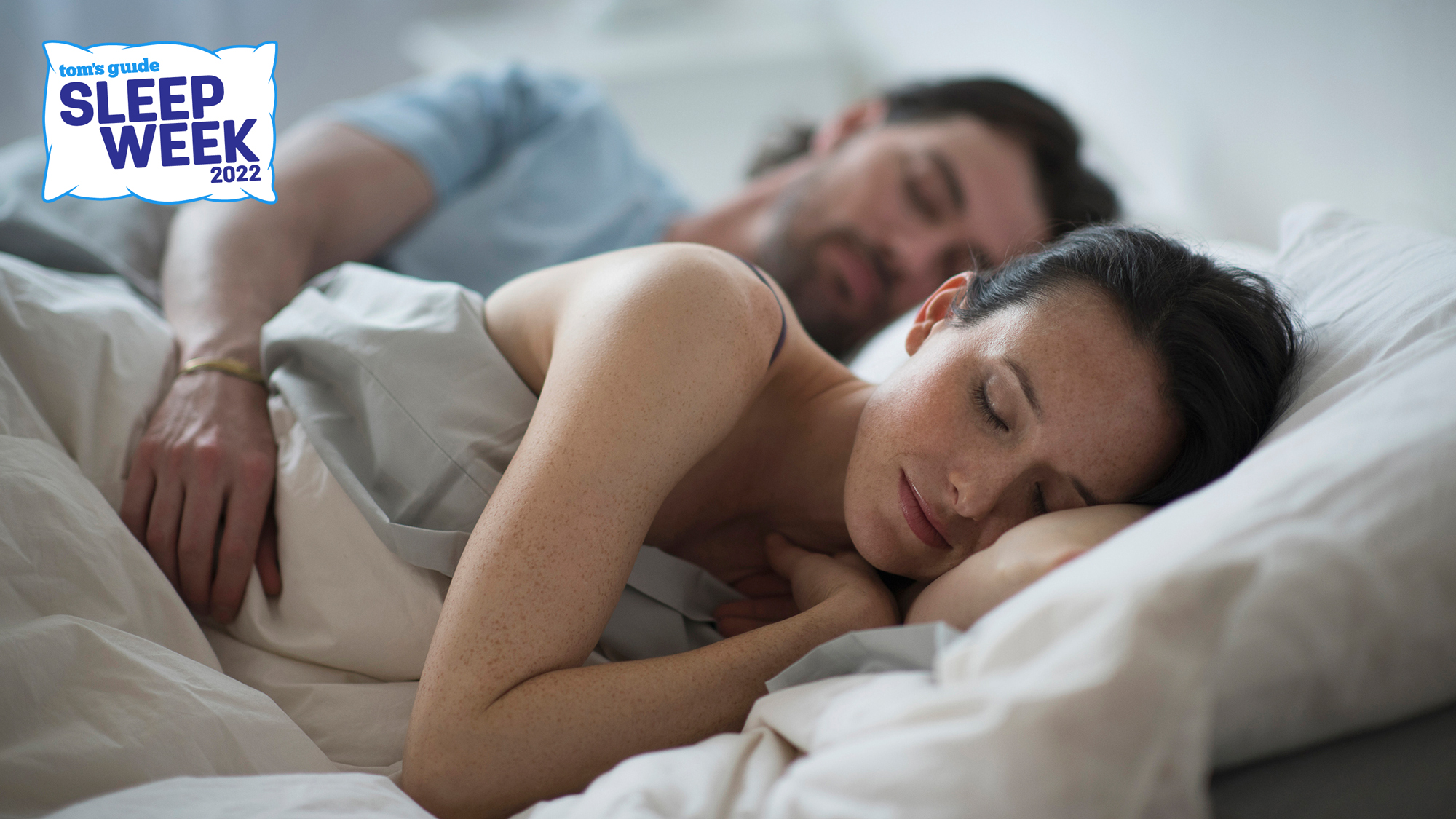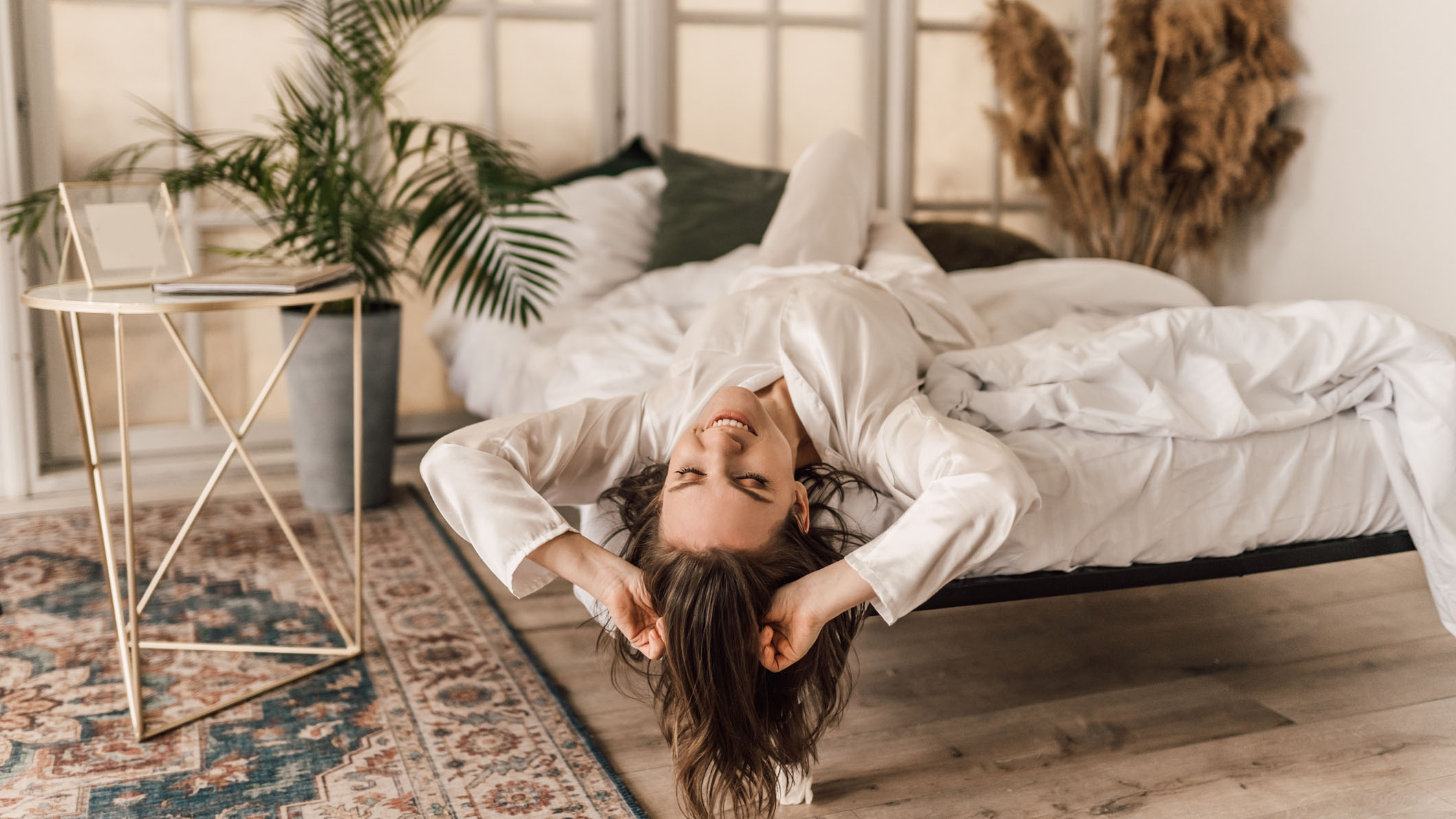7 surprising benefits of sleep for your health, mood and relationships
Getting decent shut-eye boosts our bodies and brains, but did you know about these lesser-known benefits of sleep?

Sleep is vital for our physical and mental wellbeing, yet we don’t always prioritize it in the way we should. When we’re busy and feel the pressure of getting everything done by a specific deadline, it can be tempting to skimp on sleep in order to get more done.
Avoid heavy meals in the two hours before bed
Avoid caffeine after lunchtime
Try lavender pillow spray to promote restful sleep
Keep your bedroom a screen-free zone
Consider wearing blue-light-filtering glasses at night
However, and as we’ll learn here when looking at the benefits of sleep, skimping on shut-eye is one of the worst things you can do for your energy levels, focus, mood and productivity. Just like having a healthy diet and getting regular exercise, having enough sleep is an essential part of looking after yourself.
So what happens when you don’t? Well, when we recently spoke to renowned sleep expert Dr Sophie Bostock about the symptoms of sleep deprivation, we learned that a regular lack of sleep has many adverse effects, from moodiness to weight gain to chronic disease, while good sleep has big advantages. Here are seven of the more surprising benefits of sleep…
1. Sleep is a natural painkiller
Professor Matthew Walker, author of the best-selling Why We Sleep, and a scientist at the University of California was the senior study author on a fascinating research project that looked at how poor sleep affects pain.
“Sleep is a natural analgesic that can help manage and lower pain,” Walker explained when speaking about how sleep affects the brain’s ability to naturally relieve pain. “Sleep loss not only amplifies the pain-sensing regions in the brain, but blocks the natural analgesia centers too.”

2. Good sleep helps you feel more sociable
We’ve known for some time that good sleep reduces stress and anxiety (both of which can make us irritable), but research published in 2019 showed how sleep benefits our relationship and friendships too. In short, a good night’s sleep makes us want to approach others and interact with them more.
Sleep, especially a lack of it, also affects our language and how well we can verbally communicate with others. But that isn’t all… Researchers involved in the study, published in Nature Communications, concluded that, “A lack of sleep leads individuals to become more socially avoidant, keeping greater social distance from others.”
Get instant access to breaking news, the hottest reviews, great deals and helpful tips.
3. Restful sleep makes for safer drivers
Get a good night’s sleep and your passengers and fellow drivers will thank you for it. “Sleepiness affects reaction time and decision-making, which are critical to safe driving.” Rebecca Needham, road safety officer for RoSPA explains. “It contributes to almost a quarter of fatal and serious road accidents.”
A study on sleep deprivation led by Dr. Itzhak Fried at UCLA Health came to similar conclusions. “Severe fatigue exerts a similar influence on the brain to drinking too much,” Dr Itzhak Fried said when unveiling the research. “We discovered that starving the body of sleep also robs neurons of the ability to function properly… This leads to cognitive lapses in how we perceive and react to the world around us.”
4. It also helps you look younger
Thought beauty sleep was a myth? Think again, as getting regular, good quality sleep at night acts as a natural facelift. How come? Melatonin, the hormone we need for sleep, also doubles as a powerful anti-ager. When you’re asleep, blood flow to your skin is increased, collagen supplies are rebuilt, and repairs are made to UV exposed skin.
A 2017 study that looked at the effects of restricted sleep on facial appearance found that just two days of sleep restriction negatively affected participant’s perceived attractiveness.
Another study carried out by researchers at the University of Manchester, found that circadian rhythm (your natural body clock) has an effect on the production of collagen, a protein that helps keep our skin plump and youthful-looking.

5. Sleep benefits your weight
Scientists are still exploring the relationship between sub-par sleep and weight gain, but several studies have linked the two. A lack of sleep triggers a rise in cortisol, nature’s alarm system, which tells your body to conserve energy for a possible fight or flight situation. What does that mean for your weight? You hang on to more fat, basically.
Clinical nutritionist Suzie Sawyer says: “Sleep keeps weight under control. Inadequate sleep lowers levels of leptin – a hormone that suppresses appetite – but increases ghrelin, which stimulates appetite. This effect seems to be heightened in people sleeping five hours or less.”
6. Sleep helps you make memories
Ever heard the expression ‘sleep on it?’ That’s because sleep helps you process your feelings better, and to solidify new information and memories. In the fall of 2019, two MIT professors discovered a link between sleep and test scores. They found that the less students slept during a semester, the worse their scores were.
However, professor Jeffrey Grossman argued that it isn’t just about how much sleep you get: “When you go to bed matters,” said Grossman. “If you get a certain amount of sleep… as long as it’s before certain times, say you go to bed at 10 or at 12 or at 1, your performance is the same. But if you go to bed after 2 your performance starts to go down even if you get the same seven hours.”
7. Good sleep plays a role in preventing depression
Researchers have been looking closely at how sleep affects mental health for many years now, and one study in particular, published in the Australian and New Zealand Journal of Psychiatry, claims that people with insomnia and other sleep issues are at a higher risk of depression.
According to experts at Harvard Health, sleep disorders are common among people diagnosed with anxiety, depression, ADHD and other conditions. ‘Sleep and mood are closely connected; poor or inadequate sleep can cause irritability and stress, while healthy sleep can enhance well-being.’

How to get a better night’s sleep
So, now that you know some of the more surprising benefits of sleep for your physical and mental health, it’s time to look at how you can get more good quality shut-eye each night.
Your bed plays a big role in how comfortable you feel, because when you’re comfy you’ll drift off easier and faster. So make sure you have the best mattress for your body and sleep style, and if you need a comfort upgrade for an older bed, consider investing in one of the best mattress toppers.
Here are some other tips for getting a better night’s sleep:
- Go to bed and wake up at the same time each day
- Create a bedtime routine that relaxes you ready for sleep
- Don’t eat a heavy meal within two hours of bedtime
- Don’t consume caffeine after midday
- Limit or cut out alcohol as it disrupts sleep
- Choose dim lighting in the evenings to boost melatonin production
- Ensure your bedroom is dark, cool and quiet for sleeping
- Listen to a relaxing sleep app to calm a busy mind
- Invest in a new pillow if yours is more than two years old
- If you’re feeling restless or anxious, try a good weighted blanket
- Expose yourself to natural daylight early in the morning to strengthen your circadian rhythm (your body clock)
Save up to $750 on mattresses at Nolah Sleep
We’ve teamed up with Nolah to offer you an exclusive discount of up to $750 off memory foam and hybrid mattresses (with code TGNOLAH). Each model is made with cutting-edge mattress tech to help you sleep cooler and to relieve pressure on your back and hips. You’ll get free shipping and a 120-night trial too.
This article is part of Tom’s Guide’s Sleep Awareness Week 2022 celebration, running until Saturday 19 March. Stay tuned for plenty of sleep tips, advice and expert-rated products to help you sleep better this year.
Grace is an experienced sleep writer and mattress reviewer who also contributes to our sister site TechRadar, among other Future plc brands. She's a big fan of organic sleep products and has recently invested in a wool mattress topper that she quite happily describes as "life-changing." (Hey, we're serious about our sleep products). When she isn't testing mattresses or writing about sleep, Grace enjoys reading and creative writing, and incorporates meditation and yoga into her wellness routine.
 Club Benefits
Club Benefits







